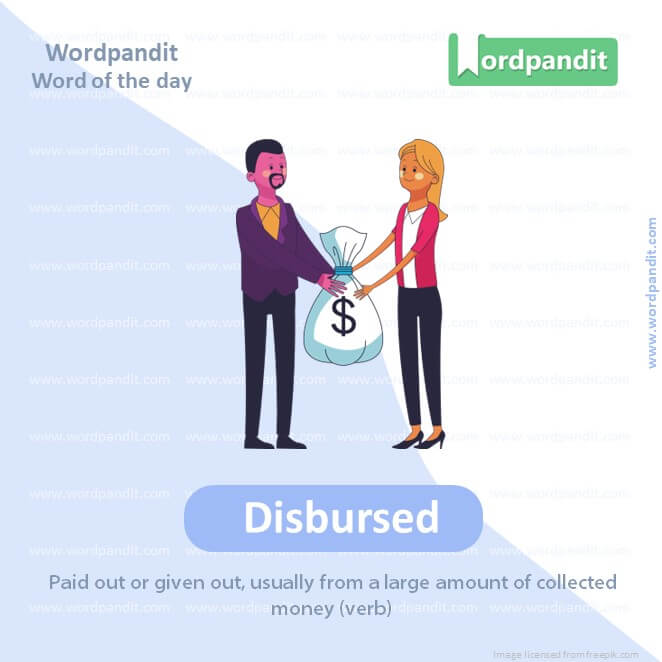Daily Vocabulary Words: List of Daily Used Words in Leading Indian Newspapers
Hi there. Welcome to this special section @ Wordpandit. Our endeavour here is straightforward: highlighting daily vocabulary words that you would come across in leading newspapers in the country. We have included the following newspapers in our selection:
• The Times of India
• The Economic Times
• Hindustan Times
• Mint
• Indian Express
We are putting in extensive work to develop your vocabulary. All you have to do is be regular with this section and check out this post daily. This is your repository of commonly used words; essentially, we are posting a list of daily used words. Hence, this has significant practical application as it teaches you words that are commonly used in leading publications mentioned above.
Visit the website daily to learn words from leading Indian newspapers.

WORD-1: Staggering
CONTEXT: It is indeed unfortunate that these staggering amounts are once again made without regard to earlier court rulings and contrary to a central law.
SOURCE: Indian Express
EXPLANATORY PARAGRAPH: Imagine you see a number so big you can hardly believe it! Like if you saw a cookie jar holding a hundred cookies. That’s what staggering is like. It’s when something is so surprising or so much that it makes you go “Wow!”
MEANING: So surprisingly large, shocking, or amazing that it’s hard to believe (adjective).
PRONUNCIATION: STAG-er-ing
SYNONYMS: Astonishing, Overwhelming, Remarkable, Shocking, Astounding
USAGE EXAMPLES:
1. The number of stars in the sky is staggering.
2. She won a staggering amount of money in the lottery.
3. The staggering height of the mountain awed the climbers.
4. The crowd was staggering in size at the concert.

WORD-2: Disbursed
CONTEXT: It is difficult to understand how a GST demand of 28 per cent can now be made on the entire amount which has been disbursed to thousands of winners over the last six years.
SOURCE: Indian Express
EXPLANATORY PARAGRAPH: Disbursed is when your piggy bank is opened, and the money inside is given out for different things, like buying toys or snacks.
MEANING: Paid out or given out, usually from a large amount of collected money (verb).
PRONUNCIATION: dis-BURST
SYNONYMS: Paid out, Distributed, Allocated, Spent, Issued
USAGE EXAMPLES:
1. The prize money was disbursed among the winners.
2. After the fundraiser, the money was disbursed to the charity.
3. The company disbursed bonuses to all its employees.
4. Emergency funds were disbursed to the flood victims.

WORD-3: Assimilationist
CONTEXT: the Northeast, despite having played the politics of difference at multiple levels for several decades, seems to be succumbing to the party that is most assimilationist in its agenda.
SOURCE: Hindustan Times
EXPLANATORY PARAGRAPH: Assimilationist is like when you have a new student in your class, and they start to play the same games and talk like everyone else so they can be part of the group.
MEANING: A person who advocates or participates in blending in with the surrounding culture (noun).
PRONUNCIATION: uh-SIM-uh-lay-shuh-nist
SYNONYMS: Integrator, Adapter, Conformer, Melding, Incorporator
USAGE EXAMPLES:
1. The new immigrants were assimilationists, quickly adopting the local customs.
2. She was an assimilationist, speaking the new language fluently within a year.
3. Assimilationist policies in history often meant losing one’s original culture.
4. He was criticized for his assimilationist views.

WORD-4: Prophets
CONTEXT: This election has also brought out more than its fair share of such prophets.
SOURCE: Times of India
EXPLANATORY PARAGRAPH: Prophets are like very wise people from long ago who people believe could tell what would happen in the future or teach important lessons.
MEANING: People who are believed to speak for a god or for gods, or to see the future (noun, plural).
PRONUNCIATION: PROF-its
SYNONYMS: Seers, Oracles, Visionaries, Predictors, Soothsayers
USAGE EXAMPLES:
1. Many prophets are mentioned in religious texts.
2. She studied the teachings of ancient prophets.
3. The prophets foretold of great changes to come.
4. People traveled far to seek the wisdom of the prophets.

WORD-5: Evangelist
CONTEXT: there is no doubt that a door has been opened with a prominent lay evangelist.
SOURCE: Times of India
EXPLANATORY PARAGRAPH: An evangelist is like someone who loves a certain superhero so much that they tell everyone about them and tries to make them fans too.
MEANING: A person who talks about and promotes something with great enthusiasm, often related to religion (noun).
PRONUNCIATION: ih-VAN-juh-list
SYNONYMS: Preacher, Missionary, Advocate, Promoter, Crusader
USAGE EXAMPLES:
1. He became an evangelist, spreading his faith to others.
2. The tech evangelist gave talks about the latest gadgets.
3. As an environmental evangelist, she taught people about recycling.
4. The evangelist held revival meetings in the town square.
WORD-6: Deviated
CONTEXT: Current contestations over the language can be addressed by demonstrating that it has not deviated from its foundational role.
SOURCE: Hindustan Times
EXPLANATORY PARAGRAPH: Deviated is like when you’re walking straight on a path and then take a different direction to chase a butterfly or explore a cool-looking path.
MEANING: Went off from the main path or the usual way of doing things (verb).
PRONUNCIATION: DEE-vee-ay-tid
SYNONYMS: Strayed, Diverged, Veered, Swerved, Departed
USAGE EXAMPLES:
1. The conversation deviated from the original topic.
2. The plane deviated from its course due to the storm.
3. Her style deviated from the usual trends.
4. The story deviated into unexpected territory.
WORD-7: Grandiose
CONTEXT: This is reflective of the anxieties and apprehensions produced by the grandiose claims and pronouncements that are irresponsibly made by rashtrabhashawadis.
SOURCE: Indian Express
EXPLANATORY PARAGRAPH: Think of the biggest, most amazing castle you can imagine, with huge towers and lots of decorations. That’s what grandiose is like – something so big and fancy it’s really special.
MEANING: Very big and impressive, sometimes too fancy or overdone (adjective).
PRONUNCIATION: GRAN-dee-ose
SYNONYMS: Magnificent, Imposing, Majestic, Lavish, Splendid
USAGE EXAMPLES:
1. The grandiose palace dominated the city skyline.
2. She had grandiose plans for her birthday party.
3. The movie featured grandiose special effects.
4. His grandiose manner was sometimes off-putting.
WORD-8: Unabashedly
CONTEXT: The founding figures of modern Hindi literature — the famed Bharatendu Mandal — unabashedly borrowed from the likes of Bankim Chandra Chattopadhyaya and Michael Madhusudan Dutt.
SOURCE: Indian Express
EXPLANATORY PARAGRAPH: Unabashedly is when you do something without being shy or sorry about it, like singing loudly in the shower even if everyone can hear you.
MEANING: Without any embarrassment or shame, confidently (adverb).
PRONUNCIATION: un-uh-BASH-ed-ly
SYNONYMS: Boldly, Unashamedly, Brazenly, Unapologetically, Fearlessly
USAGE EXAMPLES:
1. She danced unabashedly in the rain.
2. He unabashedly shared his unpopular opinion.
3. The child unabashedly asked for a second dessert.
4. They unabashedly celebrated their victory.
WORD-9: Sprawling
CONTEXT: It had superseded to emerge as the sprawling region’s representative language.
SOURCE: Indian Express
EXPLANATORY PARAGRAPH: Imagine a toy town spread out over your entire playroom floor with houses, cars, and trees everywhere. That’s like sprawling – when something spreads out over a big area.
MEANING: Spreading out over a large area in an untidy or irregular way (adjective).
PRONUNCIATION: SPRAWL-ing
SYNONYMS: Expansive, Spreading, Extensive, Rambling, Scattered
USAGE EXAMPLES:
1. The city was a sprawling metropolis, covering many miles.
2. The mansion had a sprawling garden.
3. The festival became a sprawling event with many attractions.
4. Vines were sprawling across the old fence.
WORD-10: Antagonistic
CONTEXT: Khari Boli Hindi and Urdu, which had for long been one language — Hindustani — with two scripts, was now projected as two separate and antagonistic languages.
SOURCE: Indian Express
EXPLANATORY PARAGRAPH: Antagonistic is when someone acts like a villain in a story, always opposing the hero and trying to make things difficult.
MEANING: Showing opposition or hostility towards someone or something (adjective).
PRONUNCIATION: an-tag-uh-NIS-tik
SYNONYMS: Hostile, Adversarial, Opposing, Combative, Aggressive
USAGE EXAMPLES:
1. The two politicians had an antagonistic relationship.
2. Her antagonistic approach made compromise difficult.
3. The review was antagonistic towards the movie.
4. He felt antagonistic towards the new policies.
vocabulary upsc
The Union Public Service Commission (UPSC) examination represents a significant milestone for many aspirants across India. Part of the journey to success involves comprehending and utilizing a robust ‘vocabulary UPSC’ that can set competitive exam takers apart from the crowd. Let us delve into the nuances of how this essential resource can be mastered effectively.
For starters, one has to understand the significance of ‘vocabulary UPSC.’ This is much more than rote learning a word list. It’s about understanding the connotations, the nuances, and the context in which these words are used. This understanding can greatly improve not only your comprehension skills but also your performance in the English language section of the The Union Public Service Commission exam.
Following the understanding stage, come practice and revision. ‘Vocabulary UPSC’ learning cannot occur overnight, and it is essential to devote a specified time daily to learn and review new words. Incorporating vocabulary-learning into your daily study habit can help you enhance your linguistic skills and aid in long-term retention.
Another much-needed approach to ‘vocabulary UPSC’ is using the learned words in regular communication. This method reinforces learning and aids retention. Additionally, creating a personal word diary where you note down new words, their meanings, and context can serve as your go-to guide for revision.
One common misconception about ‘vocabulary UPSC’ is that it’s only limited to English. However, it is vital to understand that the concept extends beyond languages. Terms used in subjects like History, Geography, or Economics should also be part of your vocabulary repository. This multifaceted conception can significantly aid in developing a comprehensive understanding of subjects, ultimately resulting in a higher score.
In conclusion, mastering ‘vocabulary UPSC’ requires consistent effort, deep understanding, and practical application. The journey to UPSC success is not just about learning; it’s about knowing how to use your learning effectively. So, embark on this discovery with a clear goal and unwavering dedication, and success will surely be yours.













